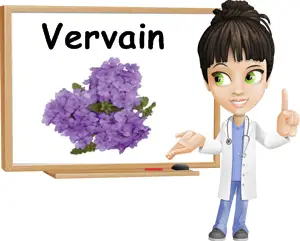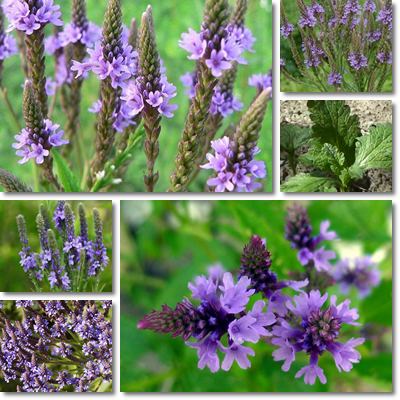Verbena officinalis, commonly known as vervain, common vervain, verbena or common verbena, is a medicinal plant native to Europe. It is a well-known herb employed by humans since ancient Roman times. Verbena officinalis is one of many varieties of the plant and the most commonly used for medicinal purposes, although there have been voices that say all varieties have about the same curative properties.
Vervain has been employed since its discovery for the treatment of gallbladder, urinary tract, liver and kidney problems, jaundice, cramps and abdominal pain. It is believed to stimulate milk production in new mothers, reduce arthritis pain, treat water retention, nerve disorders such as depression and help heal wounds and sores.
Extracts from the plant have been found to reduce fever, treat intestinal parasites infestation, maintain thyroid hormone balance and relieve respiratory problems such as cough.

What does vervain look like?
Vervain is a meager-looking flowering plant that grows to about 1 meter in height and has toothed leaves and tiny pale purple flowers held up by spikes and growing in a sort of candle stick shape. Other varieties may have white, pink, purple or blue flowers in varying shades. Overall, the plant looks like a shrubby wild flower. Other common names for vervain include holy herb, simpler’s joy, blue vervain, wild hyssop etc.
What does vervain smell like?
The common vervain as well as most of the other vervain species have little to no smell. Only one species, lemon verbena or lemon beebrush (Aloysia triphylla) has a strong lemony, but grassy fragrance coupled with woody side notes. Vervain essential oil is made from this particular variety instead of the common vervain.
What does vervain (tea) taste like?
Like many herbs, vervain has a bitter taste. The more concentrated the infusion, meaning the more of the herb is added to the tea water, the stronger and more pregnant the taste, especially the bitterness.
The common vervain is a plant of many uses. Although it does not cure fully developed diseases on its own, it is fairly useful in improving overall health and nervous, digestive and respiratory system health in particular. Its varied health benefits are a result of biologically active chemical constituents occurring naturally within the plant.

9 Benefits and uses of Vervain
So what is vervain good for?
Here are the 9 most impressive properties and health benefits of the common vervain:
1) Antispasmodic and mild analgesic properties
This basically means that vervain extracts or infusions can help relieve muscle pain caused by spasms, cramps, aches etc. Plant infusions are used for treating abdominal pain and cramps of varying causes as well as to help relieve arthritis, joint and gout pain, but more research is needed for the latter.
2) Mild sedative effects.
Traditional medical practices recommend vervain as a mild sedative for people suffering from insomnia. Research has revealed that the compound in verbena responsible for inducing sleep is verbenalin, an iridoid glucoside.
3) Digestive benefits
Vervain has been found to stimulate digestive juices, particularly bile secretion, resulting in improved digestion, in particular of fats. Its beneficial action on digestive health is a result of the natural compounds that give the plant its bitter taste.
Bile and liver disorders, heartburn, acid reflux and indigestion are a few of the conditions vervain is said to help with. Aucubin and oleanolic acid, two compounds identified in the plant, boast hepatoprotective properties.
4) Respiratory tract health
Folk medicine recommends employing vervain for the treatment of respiratory problems, particularly nasal congestion, cough or fever reduction.
While it is a gentle natural diaphoretic, inducing perspiration in order to reduce fever, verbena is generally used in combination with other medicinal herbs favoring respiratory tract health, notably elderberry.
5) Skin care and wound healing
Vervain contains natural antimicrobial and anti-inflammatory compounds such as verbascoside, a constituent found to inhibit the Staphylococcus aureus bacterium. For this reason, poultices made from the aerial parts of the plant, particularly the flowers, are applied directly to the skin to help heal wounds and prevent their infection.
6) Nervous system disorders
Vervain boasts a restorative and mildly sedative action on the nervous system, hence its traditional use for the treatment and management of nervous system disorders such as depression, insomnia, anxiety and potentially melancholy. The plant was traditionally used to to promote recovery of the nervous system following prolonged illness. Verbenalin and hastatoside may be responsible for such effects.
7) Thyroid problems
Vervain appears to help achieve an endocrine balance as a result of its regulating effect on thyroid hormone production. Although more research is required on the subject, folk medicine recommends its use for symptoms associated with both a low and a high thyroid hormone production.
8) Natural diuretic
Vervain boast mild diuretic properties and, as a result, helps combat water retention and indirectly improves kidney function. Moreover, apigenin, a compound occurring naturally in the plant, has been found to help prevent kidney damage.
9) Potentially useful for new mothers
Vervain has been used in folk medicine to help stimulate milk flow in new mothers. However, preliminary research suggests the plant poses risks for pregnant women as it may cause miscarriages.
Final Considerations
Overall, the biologically active compounds in the plant such as beta-sitosterol, iridoid glucosides, apigenin, aucubin, verbenalin and verbascoside are responsible for the health benefits of vervain.
However, it is important not to exceed the doses recommended by your healthcare professional. Should you exceed your recommended intake, you may risk unwanted side effects such as diarrhea, nausea, vomiting, abdominal pain or convulsions.
Also, considering there is limited research on the effectiveness of the plant in the treatment of certain medical conditions, you may want to first discuss with your doctor the use of vervain as an alternative treatment.
